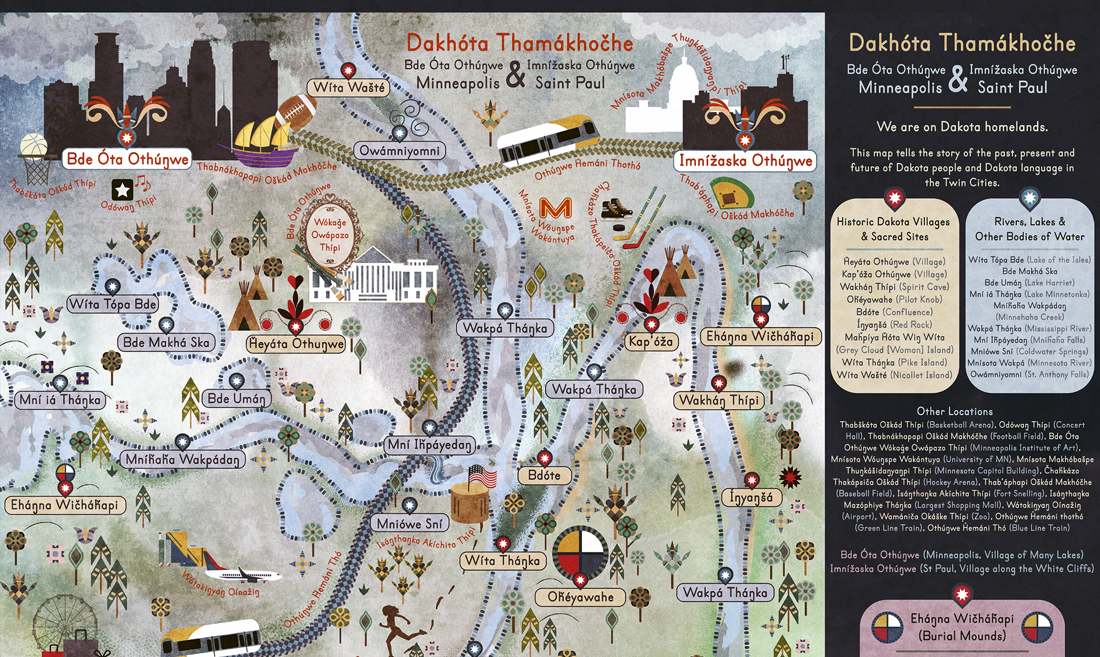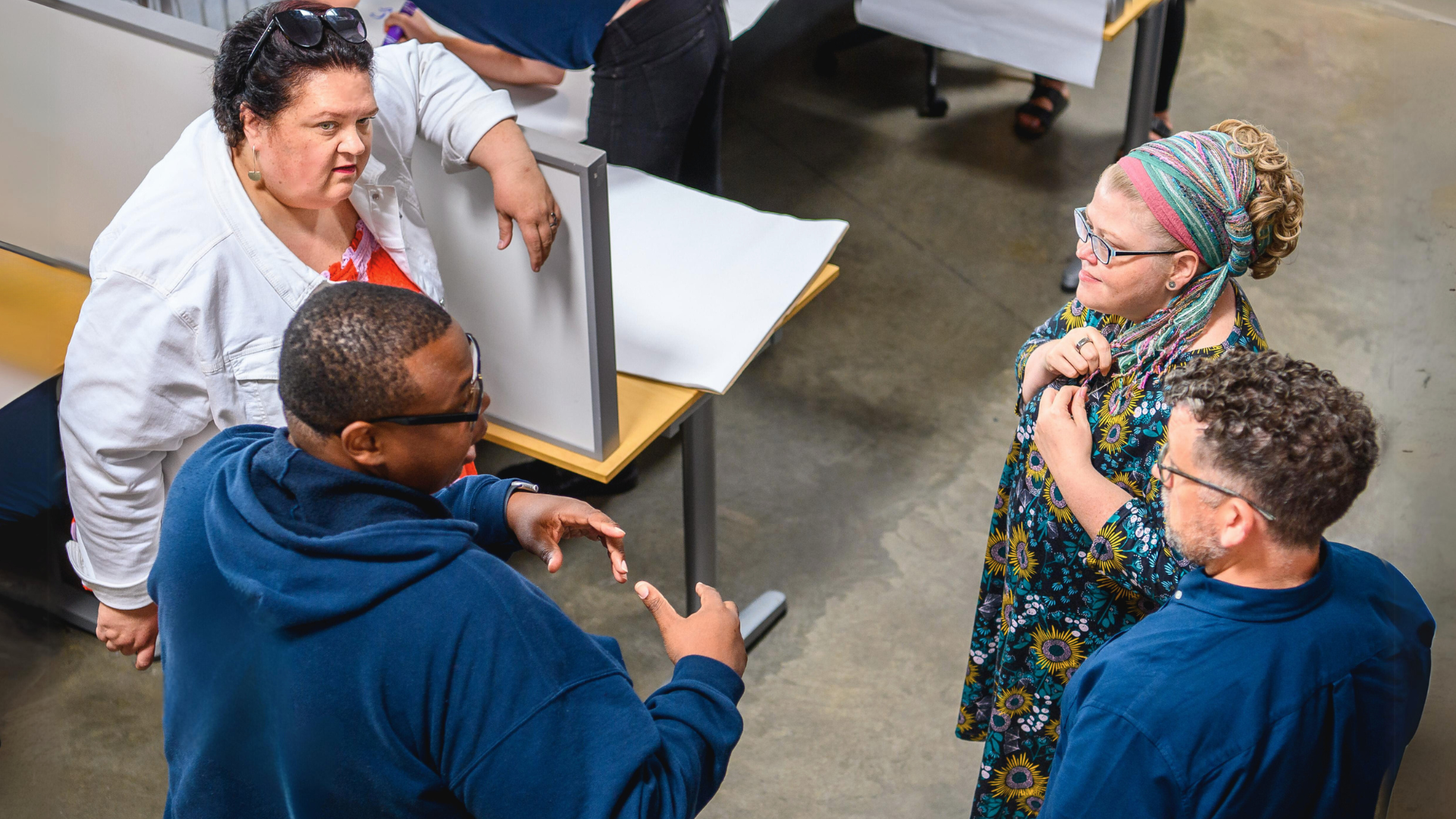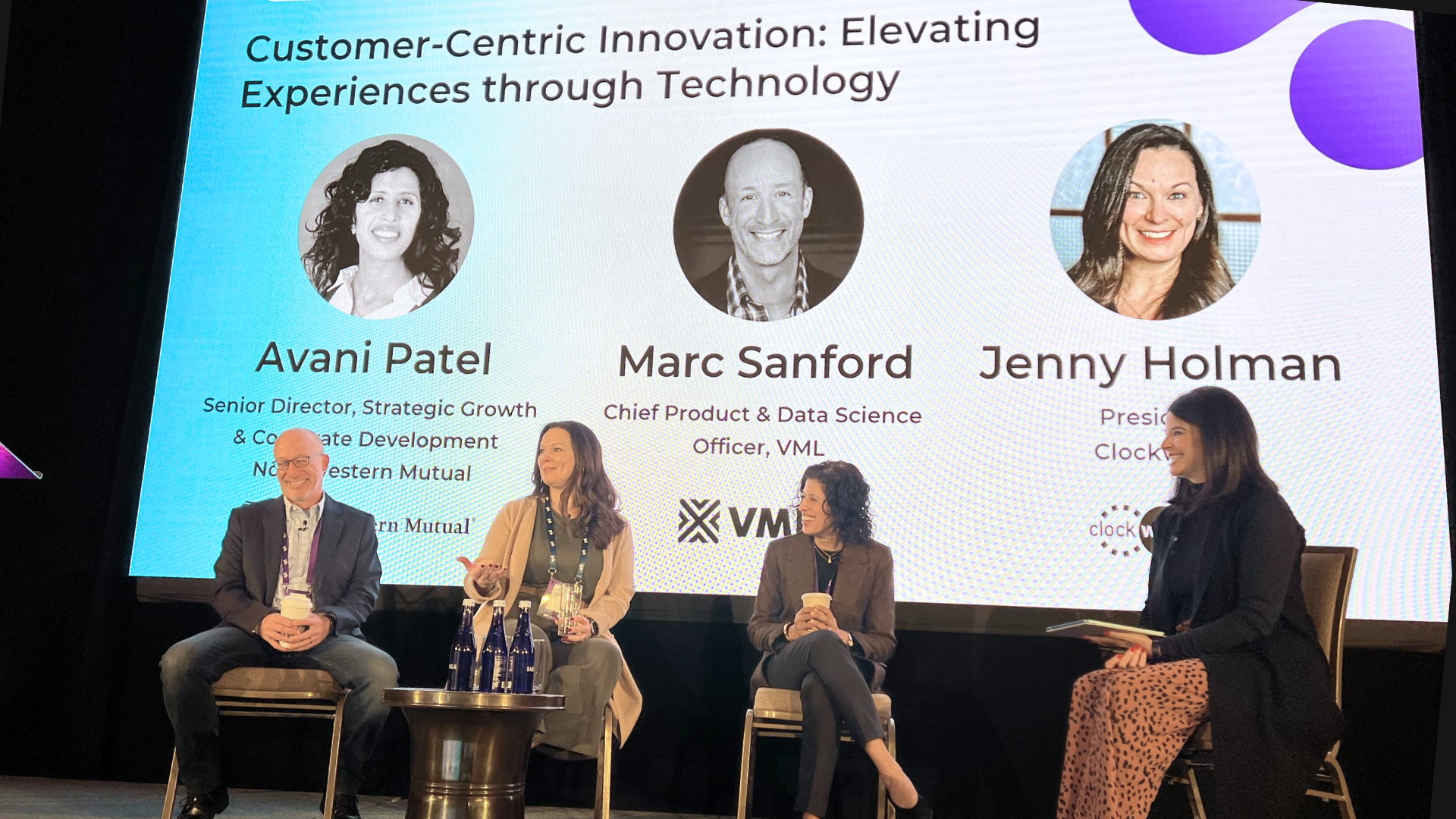The featured image above is a free resource created by Marlena Myles, a Native American (Spirit Lake Dakota/Mohegan/Muscogee) artist located in Saint Paul, Minnesota. Access her Dakota land map and accompanying audio to learn about the past, present, and future of the Dakota people.
On Monday, Clockwork will be closed in observance of Indigenous Peoples’ Day, a significant day that celebrates and honors the native communities who have lived on this land for thousands of years. The decision to close is not one we’ve taken lightly. It reflects our company’s values and our desire to recognize the important narratives, stories, and cultures that have contributed to the rich history of our shared existence.
Our roots (and our building) are firmly planted in Minnesota. Our home state has a profound connection to its indigenous communities, home to Dakota, Ojibwe/Anishinaabe, and other native peoples. Their histories are inextricably interwoven with the land upon which we live and do business today. The intricate tapestries of indigenous cultures, traditions, and languages have played an invaluable role in shaping this region’s identity.
Indigenous Peoples’ Day began as a counter-celebration to Columbus Day, aiming to recognize the native populations and honor the land stolen by European colonization. Minnesota, in its ongoing commitment to inclusivity and recognizing the deep-rooted presence of its indigenous communities, officially adopted Indigenous Peoples’ Day in 2016. By doing so, the state acknowledged indigenous communities’ historical and modern-day significance and immeasurable contributions to our state’s culture and industry.
Our decision to close on Monday is more than just a gesture. It’s a commitment. We stand in solidarity with the native communities of Minnesota and around the world. We encourage our friends, neighbors, and colleagues to join us in taking time on Monday to reflect upon, learn more about, and honor indigenous histories, cultures, and people. Their stories matter, their rights matter, and their futures matter. Let’s all do our part in ensuring these truths are recognized and celebrated.
We’ve assembled a list of ways our staff might consider spending time on Monday and any day to honor Indigenous people. Perhaps this list will be of value to you in your businesses, communities, and families. Many of these activities also include links to celebrations or businesses you can visit and/or support; while this list is Minnesota-centered, many resources are available to anyone across the country.
Educate Yourself:
Spend the day reading books or articles by Indigenous authors or about Indigenous history, culture, and issues.
Birchbark Books and Native Arts
Visit Cultural Sites:
Take a trip to local Indigenous cultural centers, museums, or historical sites to learn more firsthand.
We Move We Stay Exhibit at the MN Science Museum
This permanent exhibit on Level 4 of the science museum displays objects and artifacts of generations of Dakota and Ojibwe people.
Our Home: Native Minnesota at the Minnesota History Center
The Wadakota Walk At Caponi Art Park
Wodakota means “Harmony and Peace with all in the Universe.” This new interactive art installation by Marlena Myles, a local Native American (Spirit Lake Dakota/Mohegan/Muscogee) artist, offers five stops that weave Dakota stories into the landscape of Caponi Art Park using digital art, animation, and sound.
Attend Local Events:
Participate in community events celebrating Indigenous Peoples’ Day, such as parades, powwows, or ceremonies.
Owamni Falling Water Festival
Five Ways To Learn About Native American Culture in Minnesota
Land Acknowledgment:
Take a moment to research and recognize the Indigenous peoples who originally lived on and cared for the land you now reside on.
A Guide To Indigenous Land Acknowledgment
Indian Mounds Regional Park
The Indigenous burial ground that is currently called “Indian Mounds Regional Park” has been a sacred site and place of burial for over a thousand years.
Support Indigenous Art:
Purchase or appreciate art from local Indigenous artists, whether online or in physical galleries.
Google Arts and Culture: Indigenous Art
Watch Documentaries:
Stream documentaries that focus on Indigenous history, struggles, and accomplishments.
Powerful Documentaries Honoring Indigenous Peoples
Listen to Indigenous Music:
Explore music from various Indigenous cultures, whether it’s traditional, contemporary, or a blend.
Indigenous Musicians You Should Listen To Now
Support Indigenous-owned Businesses:
Buy from Indigenous-owned shops, eateries, or online stores.
Decolonize your shopping list with these Twin Cities Native businesses year-round.
Crafts and Art:
Learn a traditional craft or art form, ensuring that it’s done respectfully and with an understanding of its significance.
Indigenous crafts and art books
Cook Traditional Foods:
Research and prepare a dish from an Indigenous culture, understanding its history and significance.
The Sioux Chef’s Indigenous Kitchen by Sean Sherman
Nature Walk:
Take a mindful walk in nature, reflecting on the Indigenous principle of land stewardship and interconnectedness.
Donate:
Contribute to Indigenous causes, organizations, or initiatives that resonate with you.
Nine Best Charities for Native Americans
Engage on Social Media:
Share educational resources, stories, or highlights about Indigenous Peoples’ Day, amplifying Indigenous voices and perspectives.
Join Online Workshops or Webinars:
Attend virtual events focusing on Indigenous history, rights, and current issues.
National Museum of the American Indian upcoming interactive courses
Reflect and Meditate:
Dedicate time to meditate on Indigenous peoples’ resilience, struggles, and contributions.
Storytelling:
Listen to Indigenous podcasts or online storytelling sessions.
Plant a Tree or Garden:
In the spirit of honoring the land, consider planting native trees or plants, understanding their significance in the local ecosystem.
Locally grown, native seed plants and trees
Engage with Local Tribes:
Reach out to local tribes or Indigenous communities to learn more about how you can support them, not just on this day but year-round.
Write:
Journal your thoughts and reflections on the day, creating a personal record of your journey to understanding and respect.
Start a Conversation:
Discuss with friends or family the importance of Indigenous Peoples’ Day, sharing resources and sparking a dialogue.
This Interactive Map Shows Which Indigenous Lands You Live On




